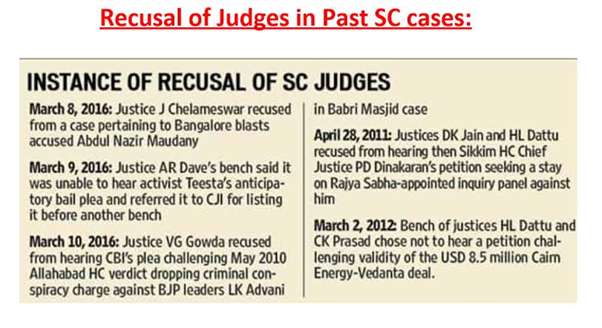Judicial Disqualification or Recusal
- Posted By
10Pointer
- Categories
Polity & Governance
- Published
8th Sep, 2020
-
- A judge of the Punjab and Haryana High Court has recused from hearing the anticipatory bail application moved by former Punjab Director General of Police (DGP) Sumedh Singh Saini, in connection with the case of disappearance and murder of a man in year 1991.
- Judicial disqualification, referred to as recus, is the act of abstaining from participation in an official action such as a legal proceeding due to a conflict of interest of the presiding court official or administrative officer.
- Motions to recuse or disqualify judges and other adjudicators have been made for all sorts of reasons.
- Most commonly such motions are predicated upon a claim that the judge is biased in favour of one party, or against another, or that a reasonable objective observer would think he might be.
- But such motions are also made on many other grounds, including the challenged judge’s:
- Interest in the subject matter, or relationship with someone who is interested in it.
- Background or experience, such as the judge’s prior work as a lawyer.
- Personal knowledge about the parties or the facts of the case.
- Ex parte communications with lawyers or non-lawyers.
- Rulings, comments or conduct.
- There are no definite rules on recusals by Judges.



